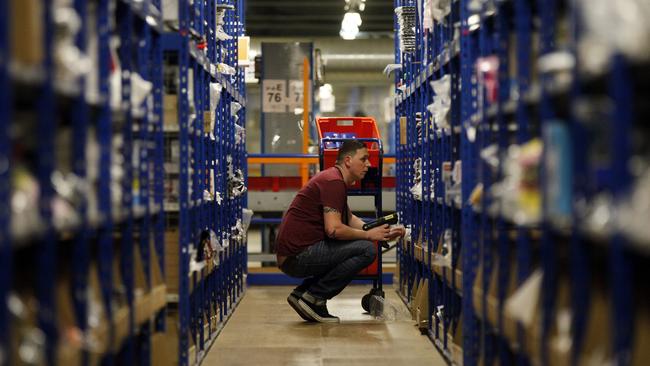Are Amazon mad? Or mad geniuses?
YOU have to work hard and long to get ahead, right? Nope. Prepare for what you know about working to be upended.

How would you like to work 70 hours a week, plus all your holidays? If the work culture at Amazon catches on, that could be the minimum expected.
The New York Times published a monster story over the weekend about the online bookstore that has expanded into e-readers, general retail, smartphones and even drone delivery. Turns out Amazon can be horrible to work for.
The journalists interviewed 100 current and former employees and uncovered some shocking work practices at the company, which is now the most valuable retailer in America, ahead of Walmart.
Here are some choice excerpts:
• “Emails arrive past midnight, followed by text messages asking why they were not answered.”
• “Nearly every person I worked with, I saw cry at their desk.”
• “Criticism from bosses for spotty internet access on vacation.”
• “A woman who had breast cancer was told that she was put on a ‘performance improvement plan’ — Amazon code for ‘you’re in danger of being fired’ — because ‘difficulties’ in her ‘personal life’ had interfered with fulfilling her work goals.”
• “One ex-employee’s fiance became so concerned about her non-stop working night after night that he would drive to the Amazon campus at 10pm and dial her cellphone until she agreed to come home. When they took a vacation to Florida, she spent every day at Starbucks using the wireless connection to get work done.”
The pressurised environment at Amazon comes from the very top. Billionaire Jeff Bezos drives his workforce hard, using data to measure every aspect of their performance and ensuring painfully blunt feedback for everyone.

Amazon keeps high performers and loses the rest. Half of employees who start there don’t even last a year.
Is there a link between Amazon’s crazy work hours, its data obsession and its success?
Maybe. Maybe not.
Google runs a different sort of ship. It lets employees take 20 per cent of their time to do their own projects. It is generous with perks. And it is double the size of Amazon.
That tells us pressuring employees to breaking point is not the only path to success.
Pressuring people comes with costs. One is obvious already — they start to hate you and when the New York Times comes knocking, they happily give the reporter damning anecdotes.
The other cost is recruiting becomes difficult. Amazon wants all the best workers, but it can only get the ones willing to sacrifice their personal lives.
Of course, the existence of one company where only the toughest survive is fine. Nobody is forced to work there.
There are many ways to run a company. Some places nurture people and get them to improve. Others throw people in the deep end and see who swims. An economy can be expected to have both.
The problem is Amazon is so darn successful that managers all over the world are likely to start emulating it.

We could all be subject to expectations for working all night, data reviews where we have to memorise 50 pages of information on tiny details of our work; or victims of the Anytime Feedback Tool, through which our colleagues can send secret feedback to our bosses. (For example: “I felt concerned about his inflexibility and openly complaining about minor tasks.”)
Of those, the big problem is expectations we should work all the time.
In America, the source of so many business trends, overall work hours are longer and 18 per cent of full-timers work 60 hours or more. The average hours worked by full time workers rose by one hour per week between 2003-04 and 2013-14 to 47.
That’s dangerous. There are very few jobs that have steady workflow every week, but plenty that expect long hours every week. That can lead to people hanging round wasting time in the quiet weeks.
Friends of mine who’ve worked in the offices of government ministers have told me how staffers sometimes chat all afternoon because they know they can do actual work after 5pm.
There’s some good in long quiet hours — they create camaraderie. But most people over a certain age would rather spend that time with their families.
In a world of data management and efficiency, employee time is an outlier — the one metric companies are proud to use profligately. Long hours are seen as a badge of honour rather than a price to pay.
But long hours — if they are compulsory — are often wasted. When time is scarce people work most efficiently. Nothing focuses the mind like a deadline. But expectations of long hours mean deadlines are further away, causing waste.
Consultants and lawyers claim that they don’t waste time — they bill clients for every six-minute increments! But are they really adding value for their clients after 8pm?
There’s enormous amounts of research showing that productivity drops when you make employees work more than about 40 hours a week. One 60-hour week might give you a bump in output. But 10 such weeks in a row gets you nothing extra except tired workers and a lot of sick days.
We’ve known this for a long time.
During World War One the British need for munitions saw factories full of women working hundreds of hours a week. Their ill-health became a concern of the Government, because of the noxious chemicals in the weapons. But the body set up to manage that issue — the Health of Munition Workers Committee — became interested in working hours.
“Seven days’ labour only produces six days’ output and ... reductions in Sunday work have not in fact involved any appreciable loss of output.”
It eventually recommended a series of cuts to working hours, each time arguing that the loss of hours would create no loss of output. Better rested workers would perform better, the committee concluded.
That has also been borne out in international comparisons. Countries that work longer have lower productivity per hour.
Somehow what we learned during war time a hundred years ago has been lost in the new war, a war to get your online purchases to you a little bit quicker.
Jason Murphy is an economist. He publishes the blog Thomas The Think Engine. Follow him on Twitter @jasemurphy.




